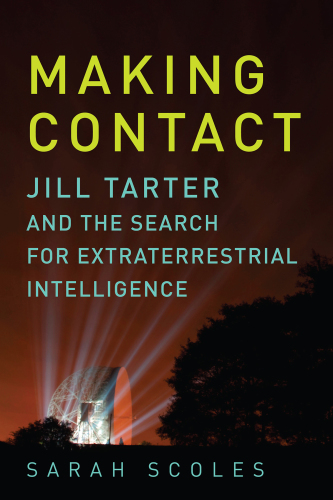
Making Contact
Jill Tarter and the Search for Extraterrestrial Intelligence
- اطلاعات
- نقد و بررسی
- دیدگاه کاربران
نقد و بررسی

May 1, 2017
In this biography, science writer Scoles celebrates the life and work of astronomer Jill Cornell Tarter and the search for extraterrestrial intelligence (SETI), the movement whose beating heart she has long been. Tarter has been searching the skies since the late 1960s, when computers ran on information from punch cards. In that time she has battled skeptical donors, derisive politicians, and constant misogyny. She was also the inspiration for the character of Ellie Arroway in the novel Contact. Scoles shares milestones and anecdotes from Tarter’s life while explaining what SETI is and how it has evolved with technological advancements. Scoles also notes the recent events that make it more possible that we may one day find life outside our world: the detection of planets orbiting distant stars and the discovery of extremophiles, which are terrestrial organisms that live in extreme conditions. Over time, Tarter’s team at the Center for SETI Research grew to include chemists, geologists, philosophers, and others. The book’s only drawback is that its narrative skips back and forth, which can make the chronology confusing. That flaw aside, Scoles shares the fantastic story of people willing to pursue a quixotic goal in the face of daunting odds. Agent: Zoe Sandler, ICM.

June 1, 2017
The inspiring story of an important American astronomer who co-founded the SETI Institute, which was created "to study all aspects of the existence, formation, and evolution of life in the universe.Reputable astronomers and other scientists have searched for extraterrestrial transmissions since the 1960s. Educated readers might name Carl Sagan as the lead figure, but that role belongs to Jill Tarter (b. 1944), an impressive pioneer who receives an admiring, insightful biography by Scoles, a former editor of Astronomy magazine who worked at the observatory where the first SETI project was implemented. "If there's just us, that seems an awful waste of space," is a line from the 1997 film Contact, delivered by Jodie Foster, a character partly based on Tarter, and both the real and fictional astronomer remain an inspiration to women entering science. The sole woman among 300 in her undergraduate class, Tarter did significant work in astronomy before becoming fascinated with stellar radio emissions that might indicate intelligent life. Although not the first, her persistence, imagination, and charisma have made her an iconic figure in the search for extraterrestrial life. Plucking an alien transmission from the avalanche of human and natural radio emissions is technically demanding, requiring sophisticated engineering. NASA provided modest support until Congress killed it. The Air Force pays to use its detectors, but fundraising preoccupies SETI leaders, Tarter included. When she began, scientists knew only one solar system and considered life a delicate phenomenon. Now we know that our galaxy contains 100 billion planets, and plenty of earthly organisms ("extremophiles") live in ice, boiling water, miles under the earth or sea, and amid toxic chemicals and radiation. Astrobiology has become a highly respected profession. Scoles has done her homework, so readers will both understand and sympathize with Tarter, who has become an icon and role model despite pursuing a goal she knows she will never achieve.
COPYRIGHT(2017) Kirkus Reviews, ALL RIGHTS RESERVED.

July 1, 2017
Astronomer, SETI (Search for Extraterrestrial Intelligence) Institute cofounder, and inspiration for the protagonist of the Carl Sagan novel (and later film) Contact, Jill Tarter has devoted more than 40 years to searching for intelligent life in the universe. Throughout, she has battled sexism, opponents of her work (both political and scientific), and reluctant funders. Scholarly existential doubt has posed her greatest challenge: When a lifetime of research yields no positive findings, is it because "nobody's out there," or because the odds of success--while greater than zero--are infinitesimal? According to science writer and former National Radio Astronomy Observatory science educator Scoles, what has sustained Tarter is a strong belief in carpe diem, stemming from her father's death during her childhood, and the hope that earthlings will get along better the more we learn about our place in the cosmos. Although the story line sprawls temporally and geographically and the last chapter includes a few too many details, those are minor flaws in a title pulling double duty as a history of the SETI Institute and the only adult biography of Tarter. VERDICT Readers interested in popular science, parascience, or women's studies will find this book absorbing.--Nancy R. Curtis, Univ. of Maine Lib., Orono
Copyright 2017 Library Journal, LLC Used with permission.




دیدگاه کاربران